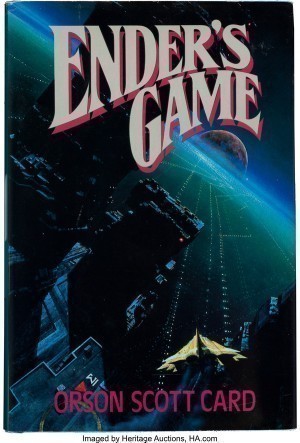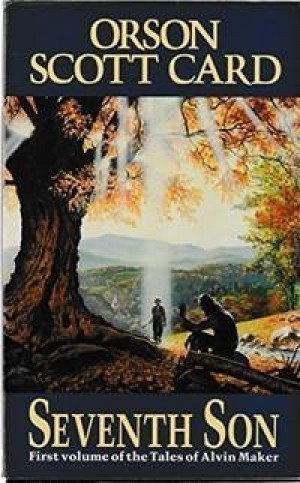 Cover of the 1985 edition of Orson Scott Card's novel, Ender's Game.
Cover of the 1985 edition of Orson Scott Card's novel, Ender's Game.
Card’s work covers a remarkable range of topics and genres, from theater and pageantry to “hard” science fiction like the Ender’s Game series and speculative history in the Tales of Alvin Maker series. Whatever genre he uses, Card tries to poke the edges of ethical decision-making, asking how people make decisions about what is right and what is true in the face of enormous social pressure.
The Ender's Game series chillingly interrogates the morality of war through the eyes of its hero, Ender, a child prodigy with a talent for military strategy whose gifts are abused to prosecute an intergalactic war of annihilation against the “bugs.” [Editor’s note on the idea of spoiler alerts: this is a literary website and we don’t respect spoilers at all.] Ender and other children are placed in an intensely competitive training program consisting of simulated war games. Ender finds out that, having won the games by essentially engaging in genocide, the simulations represent real battles in real time. Instead of being at the losing end of the victim narrative he has been taught, Ender discovers that humans are the true aggressors, seeking out new planets in order to exploit their resources. Ender’s Game became a feature film in 2013, with the theme of war under false circumstances striking a chord among audiences in the wake of the Iraq War.
The moral overtones to Card’s work have led critics and interviewers to compare the morality of his novels – particularly Ender’s Game – to his stated religious beliefs. Card, a devout Mormon whose views on homosexuality in particular have occasioned controversy, has written several works for the Church of Jesus Christ of Latter-day Saints as well as biblical novels, the Women of Genesis series, which retell biblical stories from the perspective of important female characters. Card has said in interviews that he sees his writing as essentially moral: he considers his role as a writer is to interrogate ethical ideas and search for a greater truth. In his Mountains in a Mirror, a collection of essays and short stories, for instance, he declares that he wants to “undo the skewed picture of religion that is almost completely universal in contemporary American letters,” and to amend what he calls a general ignorance of the inner life of religious people.

The Tales of Alvin Maker series combines Card’s religiosity with his fascination with the extraordinary individual. Focusing on Alvin Maker, a seventh son of a seventh son, the novels portray a speculative history of the United States in which certain people have “knacks” or powers. Alvin’s journey through the U.S. has been read as a re-telling of the origin story of the Church of Jesus Christ of Latter-Day Saints. The problems of environmental degradation, religious intolerance, and indigenous genocide figure heavily throughout the series. It is a vision of the continent’s history in which the land has a literal voice and personality and in which individuals face difficult moral choices as part of their coming to adulthood.
Card’s preoccupation with youth and the “refining fire” of confrontation with untruths propagated by a corrupt society is shared by many Utahn young adult and genre writers, such as James Dashner, whose Maze Runner Series pits a young protagonist against a series of devious traps. Similarly, Lehua Parker’s Nihui Shark Saga, about a youth who becomes trapped between the human and supernatural realms of Hawaiin folklore, places adolescents in the position of either embracing or rejecting powerful cultural traditions. The child prodigy in these and other stories owes a great deal to Ender and his original confrontation with the competing demands of his conscience and his species.

